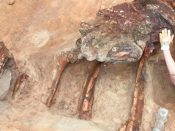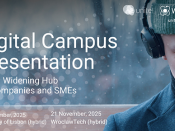Nadia Magnenat-Thalmann
https://en.wikipedia.org/wiki/Nadia_Magnenat_Thalmann
Abstract: During these last decades, the research on virtual companions have gone from the realistic modelling of virtual humans towards their real-time animation. Actually, the research is on the natural interaction between the virtual companions and the real persons. The virtual companion has to recognize the real persons, their emotions and gestures, the surrounding objects, and decides on appropriate reactions to any situation. These last years, it has been possible to replace virtual companions by social robots that look very realistic. Social robots assure a better presence and can do natural actions in the real world setting. It implies a research of the robotic hardware side with defining new motors and actuators and eventually the 3D printing of robot for body parts. The software part of the robots is the main part. Social robots should understand the surrounding world as objects for example, their use, and grasp them in a natural human way. In addition, social robots have to understand a multiparty interaction and act accordingly. We will show some examples of our ongoing research and what are the future challenges still to be solved.
Short Bio: Professor Nadia Magnenat Thalmann is the Founder and Director of the MIRALab, an interdisciplinary lab in Human Computer Animation, at the University of Geneva in Switzerland. She also serves as Director of the Institute for Media Innovation, at Nanyang Technological University (NTU), Singapore.
Her main research domains are Social Robots, Mixed Realities and Medical Simulation. She has developed the robot EVA in MIRALab and NADINE alike of herself in Singapore. Nadine is able to speak, recognize people and gestures, express mood and emotions, and remember actions.
All over her career, she has received several artistic and scientific Awards, among them the 2012 Humboldt Research Award in Germany and two Doctor Honoris Causa (from University of Hanover and from University of Ottawa). She is Editor-in-Chief of the Journal The Visual Computer (Springer Verlag) and is a Member of the Swiss Academy of Engineering Sciences.
Website: http://www.miralab.ch/nadia-magnenat-thalmann/.



















